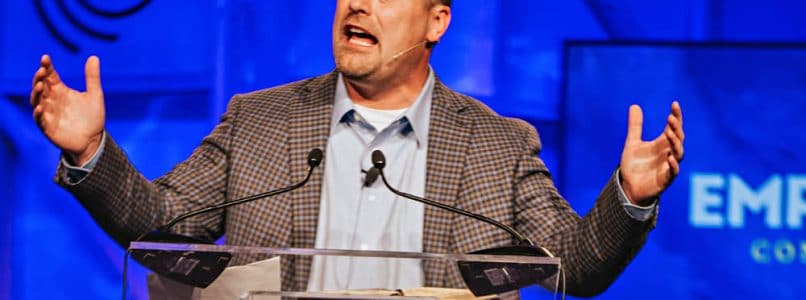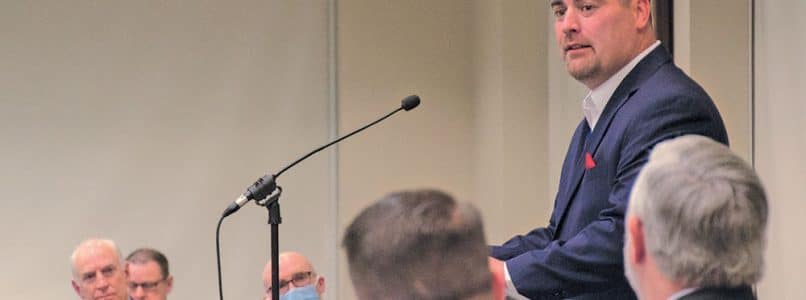AUSTIN—The 87th Session of the Texas Legislature convened Jan. 12, less than a week after rioters broke into the U.S. Capitol building and federal law enforcement warned of similar attacks against state capitols. Against that backdrop and COVID-19 mitigation protocols, the legislature opened without incident and with the usual flurry of bills.
The Texas Ethics and Religious Liberty Committee, the public policy advisory arm of the SBTC, began filtering through those bills to determine how they adhere to SBTC priorities.
In a Jan. 25 letter to Gov. Greg Abbott, Lt. Gov. Dan Patrick and Speaker of the House Dade Phelan, the committee wrote, “We are specifically praying for you and the entire legislature to seek the wisdom of God and know his ways as you promote what is good and restrain what is evil.”
Austin pastor Nathan Loudin chairs the TERLC. He and committee advisor Cindy Asmussen spoke with the TEXAN in late January about the issues the committee will promote on behalf of the SBTC’s 2669 member churches.
While the committee seeks to influence lawmakers, Loudin, pastor of Milwood Baptist Church, urged individual church members to engage their local legislators on these issues.
“I think church member participation in the legislative process matters,” said Loudin. “I think it’s one thing for our committee to write a statement and be active. It’s another thing for members of 2600 churches to be active.”
In the midst of pandemic-related disruptions, the SBTC legislative priorities change little through the years. They concern the dignity of human life as it relates to religious liberty; sanctity of life; gambling; gender identity; the family, education, and parental rights; orphan care; sex trafficking; and economic freedom.
The following are some of the bills and issues that stood out to Asmussen and Loudin from the early submissions.
Sanctity of Life
Thirteen abortion-related bills had already been submitted by late January. Loudin noted House Bill 1171 filed by fellow SBTC pastor Rep. Scott Sanford, R-McKinney. The bill would require the appointment of an attorney or guardian “to represent an unborn child during a court proceeding authorizing a pregnant minor to consent to an abortion.”
Rep. Candy Noble, R-Murphy introduced a bill prohibiting the use of tax dollars for the “logistical” support in procuring an abortion. That includes transportation and lodging. Asmussen said the bill targets Austin’s practice of using city taxes to provide transportation to and from abortion facilities.
Freshman Rep. Shelby Slawson, R-Stephenville, filed two pro-life bills. Passage of House Joint Resolution 80 would allow Texans to vote on a constitutional amendment “clarifying the Texas Constitution does not secure or protect the right to an abortion or require the expenditure of public money for an abortion.”
She also filed HB 1165, or the “heartbeat bill,” prohibiting abortions after the detection of the unborn child’s heartbeat. At least eight states have heartbeat bills awaiting implementation, pending the outcome of lawsuits brought by pro-abortion advocates. The U.S. Supreme Court could hear arguments this year in at least one of those lawsuits.
Sex Trafficking
In a broader pro-life message, the TERLC called sex trafficking “modern slavery” and called for increased awareness of trafficking and the recruiting methods of traffickers.
“The ever-expanding and increasingly mainstream pornography industry and online activity of perpetrators who pursue minors and seek ever-younger children from its lucrative films, videos, and printed materials, drives the demand for child sexual exploitation,” the committee said in its letter.
They called for policies that protect the vulnerable and prosecute perpetrators.
Gender Identity
Identity politics and resulting laws threaten parental rights and submit children to harmful medical procedures the committee said.
Rep. Celia Israel disagrees.
The Austin-area representative and founder of the Texas House LGBTQ Caucus filed HB 560 that requires licensed counselors to affirm a children’s “perceived or actual” gender identity and sexual orientation. The bill would prevent counselors—and the parents who seek their expertise—from using all of their resources when assessing a child’s needs and prescribing a course of action.
Israel’s bill requires counselors only affirm a child’s stated sexual orientation and gender identity and “support a child undergoing gender transition in accordance with established standards of care.”
Several states already have laws requiring such treatment.
“Some states and courts are allowing children to determine their sexual and gender identity, regardless of the parents’ beliefs,” the letter states. “We affirm that gender is determined by God alone and is not influenced by man or open for selection or alteration.”
To counter Israel’s legislation, Rep. Steve Toth, R-Spring, filed HB 68. It designates as “abuse” medical treatments that attempt to “change or affirm a child’s perception of the child’s sex, if that perception is inconsistent with the child’s biological sex as determined by sex organs, chromosomes, and endogenous hormone profiles.”
“I would like to see more than just conservative Christians, at this point, coming out and saying, ‘Making these policies is right for children,’” said Asmussen. “Children are not old enough to make this life-changing decision for themselves.”
Debates about transgenderism are “hot topics.” Loudin and Asmussen are concerned that too many people, including lawmakers, are unwilling to step into the fray. But on Inauguration Day President Joe Biden forced the issue onto Texas legislators.
Biden signed an executive order that makes gender identity a protected class under civil rights law. Opponents of the order argue it allows people access to sex-specific spaces and activities that confirm with their gender identity, not their biological sex.
For example, boys who identity as girls must be allowed to compete on girls’ sports teams. Where school districts across the nation have allowed this, the boys consistently win. The female athletes complained in a lawsuit that forcing them to compete against boys shuts them out of high stakes competitions and subsequent scholarships—and violates Title IV of the Civil Rights Act.
With Senate Bill 373, Sen. Charles Perry, R-Lubbock, hopes to provide a defense for Texas athletes against Biden’s order. The bill would prohibit school districts and open enrollment charter schools from allowing a student to “participate in any interscholastic athletic activity…that is designated for the biological sex opposite to the students’ biological sex as assigned at the student’s birth and correctly stated on the student’s official birth certificate.”
Orphan Care
As identity politics, especially as it relates to LGBT issues, becomes a more prominent issue in the Texas Legislature, faith-based foster care and adoption agencies continue to work under legal threats by LGBT advocates who demand the groups abandon their biblical standards for child placement. The Equity Act, legislation pending in Congress, would require all foster care and adoption agencies accept gay, lesbian and transgender clients as prospective parents.
The TERLC encourages lawmakers to protect faith-based agencies and draft policies that “assist and incentivize the adoption of orphaned children and encourage more faith-based programs for children in foster care.”
Religious Liberty
Protecting individuals and faith-based organizations from religious discrimination is interwoven throughout the TERLC legislative priorities list. Government responses to the COVID-19 pandemic tested First Amendment liberties, especially for churches. Initial coronavirus mitigation protocols included shuttering churches, including in Texas.
Although Texas houses of worship were allowed to reopen in April, religious leaders feared the precedent set would be cited to justify more shutdowns during the next declared disaster.
Representatives Matt Krause, R-Fort Worth, and Matt Shaheen, R-Plano, introduced legislation limiting the role of executive actions during a crisis.
House Joint Resolution 47, authored by Krause, proposes a constitutional amendment limiting the power of the governor to issue executive orders during a declared crisis. The legislature must be convened if the order, along with the crisis, extends beyond 30 days.
Shaheen’s bill, HB 525, declares “a religious organization is an essential business at all times in this state.” Governing authorities “may not prohibit a religious organization from engaging in religious and other related activities or continuing to operate in the discharge of the organization’s foundational faith-based mission and purpose” or “during a declared state of disaster order a religious organization to close or otherwise alter the organization’s purposes or activities.”
HB 525 allows religious organizations to sue for damages.
Gambling
An effort to legalize casino gambling under the guise of funding windstorm insurance for coastal communities has been introduced. Rep. Joe Deshotel, D-Beaumont, authored bills legalizing casino gambling in “certain coastal areas.” Revenues would help fund “residual windstorm insurance coverage and catastrophic flooding assistance in those areas.” House Joint Resolution 26 is a constitutional amendment proposal. HB 477 would regulate casino gambling.
“State budget demands will test the resolve of elected officials to provide for our needs without succumbing to the temptation to depend upon revenues from casino gambling, video lottery terminals, Daily Fantasy Sports and expanded lotteries to meet legitimate budget needs,” the TERLC said in its letter.
Loudin called gambling “biblically indefensible.”
Other attempts to broaden gambling in Texas are ongoing and Daily Fantasy Sports is especially concerning to the SBTC because of its accessibility.
In a resolution, the SBTC stated, “We believe Daily Fantasy Sports is online gambling made easily available on every smart phone.” The resolution exhorted churches to educate their members “about the damages of gambling and minister to those caught in gambling addictions.”
Economic Freedom
Gambling would only exacerbate the economic hardships Texans face during the pandemic Loudin said. In its policy statement the TERLC urged lawmakers to “consider as essential the freedom to work and earn an income from oppressive regulations, high tax rates, and lockdowns.”
The SBTC anticipates marriages will suffer under the economic stress.
“We beseech you to make the preservation of the family unit a top priority as you lead public policy efforts.”
The Family, Education of Children and Parental Rights
The legislature should “protect parental rights in the upbringing of children,” especially in areas of religious beliefs, education and medical and psychological care,” according to the TERLC.
“Those issues are older and deeper and closer to home, pre-COVID,” Loudin said.
But for parents struggling to school their children at home, the pandemic has highlighted the strengths and weaknesses of the educational system. They have become more aware of how and what their children are taught said Asmussen.
Beating the Same Drum?
Loudin and Asmussen recognize the SBTC runs the risk of appearing concerned about only a few issues like abortion and religious liberty. But those issues are fundamental to the broader issues of life and liberty, so that shoring up the foundation of these during each legislative session is imperative.
“The matters of what is a boy and a girl? What is a baby in the womb? What is religious liberty? They are so pressing and so central that they really demand a lot of our time,” said Loudin.
“Sometimes, for Christians, we get tired of being known as ‘religious liberty-abortion-people.’ And we get kind of exhausted banging the same drum every single year. But they are so fundamental to God’s ideas for flourishing in the world that it’s worth beating the drum another year. Christians shouldn’t be ashamed of that.”













